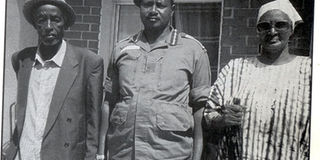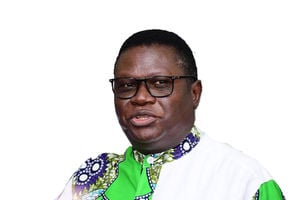Prime
Kaguta: A man of split personality

Mzee Kaguta with President Museveni and the mother in 1989. COURTESY PHOTO
What you need to know:
Legacy. The President’s father is remembered for his wise counsel and support to his family .
“My father will go to his grave without ever eating fish or chicken in any shape or form,” President Museveni wrote, 17 years ago, about Mzee Amos Kaguta.
At the time, Kaguta was not in bad health. It was a statement to accentuate the old man’s principled and conformist lifestyle. Custom has it among the President’s kins that consuming the fabled chicken and fish cuisines makes one unstable. Put another way, Mzee Kaguta acted proactively to eschew the possibility to tremor or stagger publicly, at least not by munching a tasty portion of a foul and or reptile.
It was the binder to those orthodox cultural values that most endeared President Museveni to Kaguta, and the President in his book, Sowing the Mustard Seed, flags conformity to tradition, which later inspired him to compile a Runyankore language dictionary, as the glue in their father-son relationship.
Death crudely and painfully terminated that nexus, at least in the physical world, yesterday. State House announced that Kaguta breathed his last at around 7a.m. on Friday at the International Hospital Kampala, a private medical facility in a city suburb where he had been in intensive care for a week.
Deputy Presidential Spokesperson Lindah Nabusayi said: “As we celebrate the life of Mzee Kaguta and the great contribution he has made to this country, and as we mourn his passing on, we request that the media please respect the family privacy.”
In most of Africa, death like birth is a public rite --- to celebrate or observe --- because a child is, in especially rural communities, raised by a whole society that children respectfully call adult male guardians “father” and female ones “mother”.
Evidence abounds of such communal generosity, now on the wane. For instance, Boniface Byanyima, then a teacher at Mbarara High School and without any biological relation, said he picked up and catered for a young Museveni to stay at his home because he saw him as a gifted but “needy” student.
In Sowing the Mustard Seed, the President recounts a childhood of want with a father of split personality: A conformist traditionalist and liberal Christian. On the other hand, his late mother Esteeri Kokundeka became old-school Christian upon conversion to the Native Anglican Church, as Church of Uganda was then called.
The parents took turns attending Catechism lessons before their baptism ritual in or around 1944, the same year Museveni suspects he was born, and had their son baptised on August 3, 1947 – without going through requisite lessons.
The President has said publicly that he does not know his exact age because his parents were not read, and approximated or tethered births to or around historical events.
Yesterday, State House was uniquely unambiguous that Kaguta died at 96, suggesting a similar precision should be possible with the President’s age that often colours debates particularly during election campaigns or politically-charged moments.
A man reputed by peers as hard-working, deeply knowledgeable especially about Banyankore culture, strict and generous in spite of limited means was always going to galvanise a nation in mourning, not matter what misgivings one holds about his son’s leadership.
UPC president Olara Otunnu, a Museveni political nemesis but close friend of the President’s sister Violet Kajubiri, used the cyberspace to reach a global following to convey his thoughts with the First Family upon Kaguta’s demise.
“I would like to send my condolences to the family of H.E Yoweri Kaguta...May the soul of the ‘Old Man’ Rest in Peace,” he tweeted.
Social media was yesterday humming with remembrance messages for Kaguta for producing Uganda’s longest-serving President, and under whose reign the country has, according to government officials, seen the most of stability, disciplined military and economic progress.
And the same sediment of sorrow blanketed western Uganda, Kaguta’s home region.
“Kaguta liked cows very much; he also liked people, said Eric Rutanyohoka, 90, who reportedly was Museveni’s godfather. “[Late Kaguta] was a man who would stick to an issue or opinion and he would hardly change his position.”
President Museveni too is persistent, holding resolutely to unpopular views. It’s Kaguta, recollects John Wycliffe Karazarwe, a relative, who endeavored to educate his children at the time when most parents would rather not. To most at the time, education had no worth as long as the cattle reproduced and thrived. In some ways, living solely on milk, cow blood and occasionally meat meant nature had subordinated the cattle keepers to a closed-economy, rendering the world beyond their sight irrelevant or non-existent. Pursuit of formal education did pay off for the Kaguta family.
“[Kaguta] produced for his clan and his country [because] his children became useful to this country, notes Karazarwe.
What killed Kaguta is not known, but age is said to have exacerbated his bad health that manifested in stomach pangs and head pains when he was taken into intensive care and placed under Dr Micheal Muhame’s care at IHK a week ago. Theirs too appeared to have been a fond, open and candid relationship, although the President confesses that he usually warmed up more to his late mother, Kokunduka.
However, Mzee Kaguta always held a special place in the President’s heart for insisting young Museveni went to school, something that later lifted them out of the poverty-stricken village and liberated young Museveni’s intellect; empowering him to engage in a successful protracted guerilla struggle and becoming Uganda’s longest-serving President.
Karazarew’s account of late Kaguta’s love for western education dovetails with the President’s own documented version. Kaguta moved his kraal from Kirigyime, four miles away from Kyamate primary school, to Kafunjo; two miles nearer, so that Museveni could regularly take lessons.
“Despite the strengths of his traditional forms of education and his own respect for our traditions,” the President notes, “My father recognised the value of ‘modernisation’ and was very interested in education which the Christian churches had to offer.”
Pan-Africanist
Even when he converted to Christianity, Kaguta simultaneously clung onto traditional practices despised then by his fellow devotees as devilish and retrogressive, and one could liken that resolve to the spirit of pan-Africanism that has Museveni as its enthusiastic preacher.
A man with taste for alcohol was never going to be short on surprises. Already Christianity had liberalised the appetite of Kaguta, who had until then exclusively lived on cattle products, to begin eating beans, sweet potatoes and groundnuts.
But he would later stagger away from the Christian teachings; resumed generous consumption of traditional beer, turning violent on occasions; smoked with delight; and in 1957, picked a second wife with whom he sired eight children.
Kaguta remained affable even after the son became President, something uncommon with late-comers to fame and wealth. “He has been helping people who wanted to see the President over a number of issues and concerns,” noted Sam Katugunda, chairman of the President’s Kiruhura home district.
Many will probably feel a sense of personal loss in Kaguta’s demise, but to most Ugandans and other global citizens, the respect for him derives from the works of his children, particularly President Museveni.
Whether in mourning or celebrating his life, Mzee Kaguta’s image casts gigantically over the country as an enigmatic elder, even when he mostly lived out of public sight.
He will genuinely be missed as a father, grandfather, great grandfather.
Adieu Kaguta!




